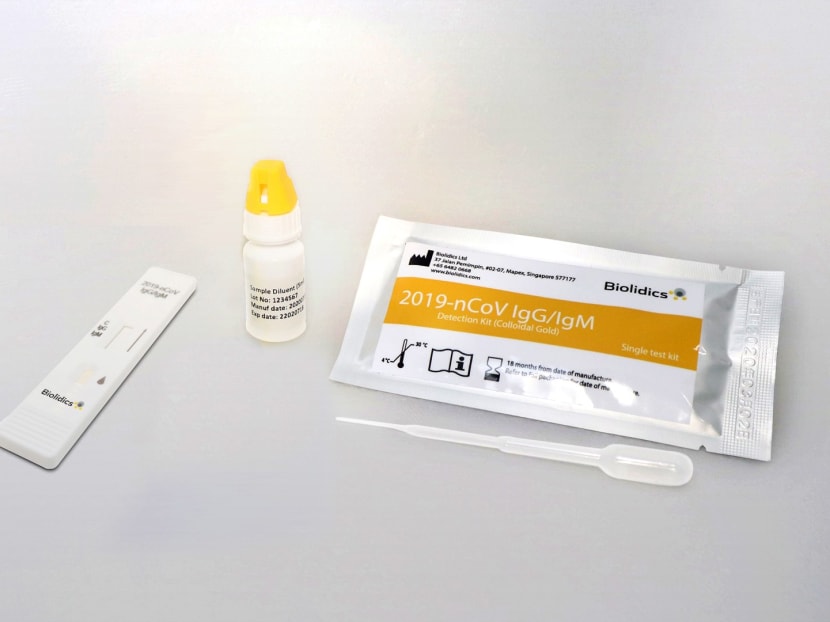Local firm develops rapid test kit that can detect Covid-19 in less than 10 minutes
SINGAPORE — A Singapore-based medical technology firm has developed a rapid test kit for Covid-19 that will be able to detect the disease in less than 10 minutes, with the first batch expected to be available by next month.

The test kits — developed by Biolidics Limited — can detect Covid-19 with an accuracy of more than 95 per cent using serum, plasma or whole blood samples.
SINGAPORE — A Singapore-based medical technology firm has developed a rapid test kit for Covid-19 that will be able to detect the disease in less than 10 minutes, with the first batch expected to be available by next month.
The test kits — developed by Biolidics Limited — can detect Covid-19 with an accuracy of more than 95 per cent using serum, plasma or whole blood samples.
In a press release on Monday (March 30), the company said that it had obtained provisional authorisation from the Health Sciences Authority for the test kits to be used in Singapore.
Biolidics added that it had been working with healthcare company Clearbridge Health to obtain the relevant approval and authorisation from the various health authorities in the region for the use of the rapid test kit.
Once the relevant approvals have been obtained, Biolidics expects the test kits to be used in the Philippines, Malaysia, Indonesia and Hong Kong.
WHAT MAKES THE KIT DIFFERENT
In its press release, Biolidics said that its rapid test kit is easy to use and can enable more effective and efficient decentralised screening among suspected Covid-19 patients.
The kits can be deployed to points of border entry as well as potential infection clusters, the company added.
“Currently, polymerase chain reaction (PCR) testing is used to confirm patients with Covid-19 but it is a laboratory technique and requires laboratory specialists and dedicated medical testing equipment. Hence, PCR testing for Covid-19 generally requires at least three hours to obtain the test results,” Biolidics said.
It added: “Given the increasing concerns over the spread of Covid-19, there is a growing demand for a simple, fast and accurate solution to control and reduce the spread of Covid-19.”
Dr Leong Man Chun, Biolidics’ interim chief executive officer, said that testing for Covid-19 is vital to “track and contain the pandemic which has spread rapidly across the world”.
“Utilising Biolidics’ rapid test kit, we can enable point-of-care testing for a larger pool of clusters, resulting in more effective and efficient decentralised screening among suspected cases. With faster and accurate results, it can guide treatment decisions and further enhance public safety measures,” said Dr Leong.
EXPERTS POINT OUT LIMITATIONS OF THE KIT
While some infectious disease experts told TODAY that the rapid test kit will likely work for what it is designed for, they pointed out that there are some limitations.
Dr Paul Tambyah, president of the Asia Pacific Society of Clinical Microbiology and Infection, said that as a serological test, it can tell if someone has been previously infected with the Sars CoV2 — the name of the virus that causes the Covid-19 disease.
“Serological tests are useful to help us know how many people in a community have immunity to a viral infection from perhaps an asymptomatic infection,” he said. “But it is not clear if this test is accurate enough for this.”
Citing a recent study by Chinese researchers into the molecular and serological investigation of 2019-nCoV infected patients, Dr Tambyah said serological tests picked up about 50 to 80 per cent of infections in people who had been treated for 10 days.
“That is not useful in acute diagnosis but could be useful in trying to determine the links between cases as was done by the Duke-NUS researchers who were able to help link the first two church clusters in Singapore,” he said.
Dr Leong Hoe Nam, an infectious diseases expert at Mount Elizabeth Novena Specialist Centre, said that Biolidics’ rapid test kit is based on the detection of antibodies.
“From other similar kits that are developed elsewhere, the test may turn positive from day four onwards, with a pickup of at least 90 per cent between from day four to day 10.”
He added that it does not replace the current polymerase chain reaction (PCR) test, and has “severe weaknesses”.
Said Dr Leong: “Negative results exclude nothing. Positive results can be because of an infection three months ago.”
The PCR test can find viral particles on a person by locating a particular coronavirus gene sequence and creating multiple copies that can then be easily detected, according to a Guardian report.
In response, a spokesperson for Biolidics said the rapid test kit is different from the PCR test, and stressed that they were meant to complement each other.
“Rapid test kits are used for point-of-care testing and it generally uses a blood sample,” said the spokesperson. “It’s easy to use, can be used in nearly all healthcare settings with a trained professional and results are much faster.”
The spokesperson added that frontline healthcare professionals may not be able to diagnose Covid-19 as the symptoms — such as fever, tiredness, and dry cough — are similar to flu.
“Biolidics' rapid test kit is meant to provide more diagnostic information about the patient so that the correct clinical management can be administered,” said the spokesperson.
The spokesperson said that while all test kits have their limitations, it is better to have some tests than none at all.
This is provided that the test kit is “reliable and robust”, and not prone to user-sample collection errors, said the spokesperson.
“Based on our clinical validation information, the sensitivity of our test kit is lower at the early stage of Covid-19 infection.”
As of Tuesday, Singapore has had 926 Covid-19 cases,
To date, a total of 240 patients have fully recovered and have been discharged from hospitals or community isolation facilities, including 12 who were discharged on Tuesday.
Of the 423 confirmed cases who are still in hospital, MOH said that most patients are stable or improving. Twenty-two are in critical condition in the intense care unit.
Three people have died from complications due to Covid-19 infection in Singapore.
ADDITIONAL REPORTING BY LOW YOUJIN








